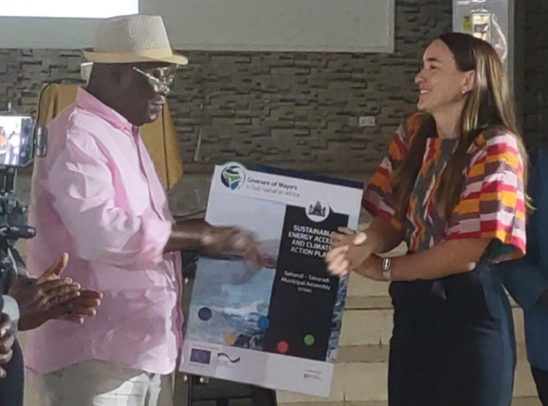Shea O’Neil (right) presenting the document to the Mayor of Sekondi -Takoradi, Abdul Mumin-Issah
Shea O’Neil (Right) presenting the document to the Mayor of Sekondi -Takoradi, Abdul Mumin-Issah
The Sekondi -Takoradi Metropolitan Assembly (STMA) has promised to help reduce greenhouse gas emissions by at least 25% by the year 2050.
The assembly also plans to divert 100% of organic waste from landfills through comprehensive waste management systems, including composting and biogas facilities.
Currently, the STMA’s vision encompasses improving resilience against climate risks, such as flooding and water scarcity, and ensuring that every household in the metropolis has access to clean and affordable energy by 2050.
On the energy front, Sekondi-Takoradi aims for 100% electricity access by 2050, with 50% of its energy coming from solar power.
The Mayor of Sekondi -Takoradi, Abdul Mumin-Issah disclosed this at the launch of the Sustainable Energy Access and Climate Action Plan (SEACAP) in Takoradi.
The SEACAP document which is the first of its kind in Ghana was launched by the Covenant of Mayors Sub-Saharan Africa (CoM SSA) in partnership with STMA.
The detailed blueprint aims to reduce emissions, enhance climate resilience, and provide clean, affordable energy by 2050, positioning Sekondi-Takoradi as a model for sustainable urban development in West Africa.
The event brought together key stakeholders, including all levels of government, civil society, and private sector to mark the beginning of the implementation plan.
Before the launch, students from Ahantaman Girls Senior High School in the metropolis planted 25 trees as a first step towards their goal of planting one million trees by 2050.
The Mayor noted that the document is structured around three core pillars, namely: climate mitigation, adaptation, and sustainable energy access.
He said the assembly would integrate sustainable practices into development planning, update its drainage systems to combat urban flooding and restore 50% of its degraded wetlands and green spaces.
“Moreover, we are focused on increasing public awareness about climate change, ensuring that by 2050, every citizen will understand the importance of environmental stewardship,” he noted.
“We will also pursue energy efficiency consumption practices in homes to increase the rate of low energy burden households from 56% to 60% by 2050,” he added.
GIZ Country Director for Ghana, Dirk Abmann, who represented the team from Europe supporting the project, praised the city’s vision and leadership.
The Programme Manager of CoM SSA, GIIZ, Shea O’Neil stressed that her outfit would assist STMA to ensure the successful implementation of the plan.
From Emmanuel Opoku, Takoradi


